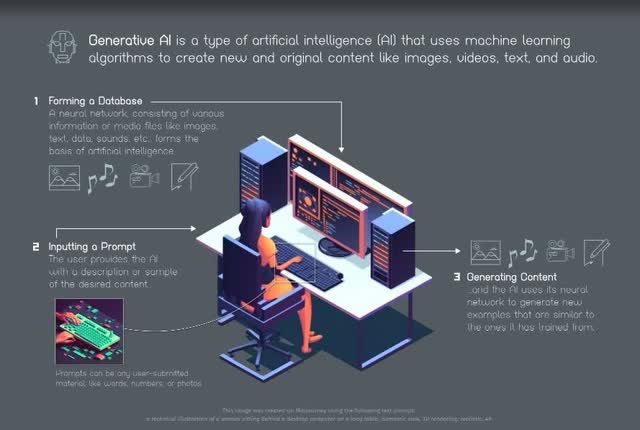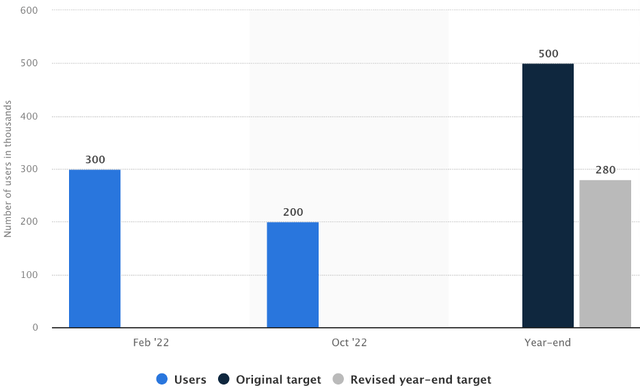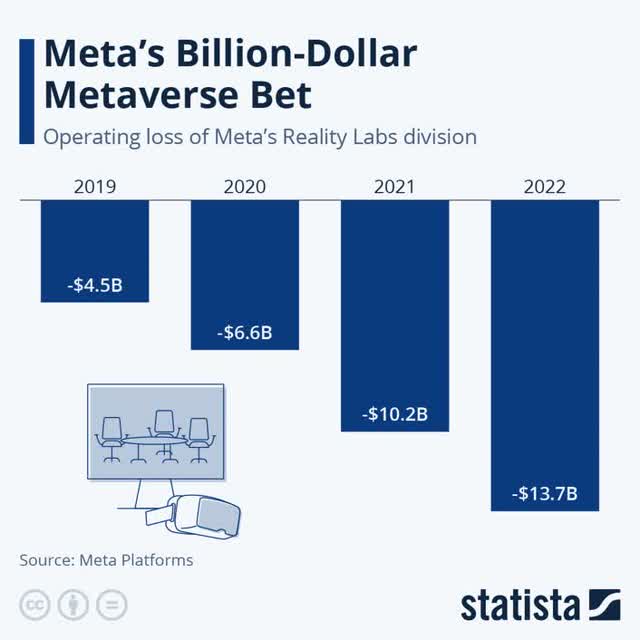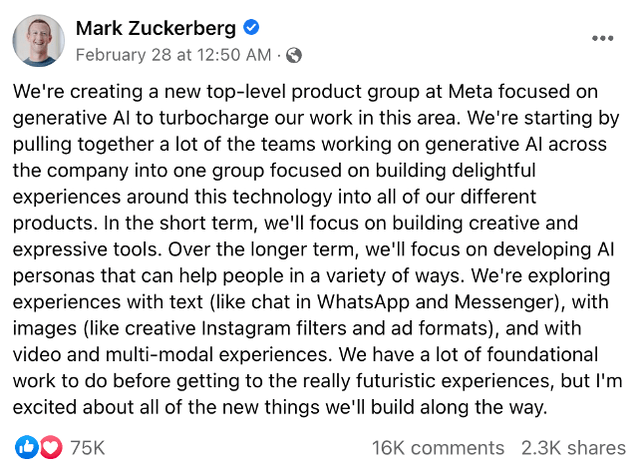Summary:
- Meta’s recent actions have given rise to speculation that the company is moving away from the metaverse.
- To validate this claim, it is important to understand the dynamics behind the metaverse and generative AI.
- Contrary to rising speculation, Meta’s shift to embrace generative AI seems a strategy to bring its ambitious metaverse plans to life.
Derick Hudson
A few weeks ago, I discussed how Meta Platforms, Inc. (NASDAQ:META) is successfully navigating Apple, Inc.’s (AAPL) threats with its AI-powered Advantage+ product suite. Meta, in recent years, has aggressively invested in developing AI-enabled products and tools to help advertisers earn more bang for the buck, and today, the company is pursuing a future powered by generative AI. Not so long ago, the social media behemoth strategically changed its corporate name to highlight how the company intends to pursue a future in the metaverse, but Meta’s recent actions, including job cuts, have given rise to speculation that Meta is moving away from the metaverse. On March 14, investors positively reacted to Meta’s latest round of job cuts as these cost reductions are expected to help the company’s bottom line this year. In this analysis, we will discuss how Meta is embracing generative AI, the technological aspects of Generative AI every investor needs to know, and the potential business impact of embracing this technology.
What Is Generative AI?
Before we discuss Meta and AI, it is important to understand the dynamics behind generative AI as this is not the same as Artificial Intelligence that we are used to. For many years, AI was considered – and used – as a tool to process and analyze data to help businesses and individuals make decisions. Generative AI, in contrast, can produce original content, create deep fake profiles and images, and even respond to queries in a human-like manner while holding a conversation like another human would. This definition of generative AI should leave you in no doubt that ChatGPT falls into this category.
Exhibit 1: Fundamentals of generative AI
With this understanding, let’s move on to discuss what Meta Platforms is up to.
Is Meta Platforms Giving Up On The Metaverse?
Some of Meta’s recent decisions have given rise to speculation that the company is giving up on the metaverse already, less than 2 years after its corporate name change. Some of these developments include the discontinuation of the digital collectibles segment and massive layoffs. The failure of Meta Horizon Worlds could be another reason behind investors’ belief that Meta will scrap plans for the metaverse. As illustrated below, Meta lost active Horizon Worlds users between February and October of last year and the company slashed its expectations for full-year numbers as well.
Exhibit 2: Number of active Meta Horizon Worlds users
Meta CEO Mark Zuckerberg’s recent comments on the company’s investments have also forced investors to believe that Meta is making a U-turn on its expectations for the metaverse. Speaking at the 2022 DealBook Summit in New York last November, Mark Zuckerberg defended the company’s push into the metaverse and claimed that the metaverse is not the priority at the company.
About 80% of our investments – a little more – go towards the core business, what we call our family of apps, so that’s Facebook, Instagram, WhatsApp Messenger, and the ads business associated with that. Then a little less than 20% of our investment goes towards Reality Labs. So still the vast majority of what we’re doing is, and will continue to be, going towards social media for quite some time until the metaverse becomes a larger thing. You can debate whether 20% is too much for this bet, but it’s not the majority of what we’re doing.
The continued losses at the Reality Labs division have forced many investors and analysts to question Meta’s long-term strategy as substantial investments in AR/VR products are yielding nothing at the moment. These mounting losses seem to be a reason behind the company’s renewed focus on efficiency gains this year.
Exhibit 3: Operating losses of Reality Labs division
Meta has announced a hiring freeze – or conditional hiring in certain instances – to curb spending amid uncertain macroeconomic conditions. Notably, the company is not going ahead with its original plans to hire thousands of new employees to establish itself as a metaverse-first tech company.
CEO Mark Zuckerberg took to Facebook last month to announce that a new top-level product group will be created to focus on generative AI, which highlights the company’s push into embracing this new technology.
Exhibit 4: Mark Zuckerberg’s announcement
Despite all the above observations, I strongly believe that Meta is still well and truly focused on the metaverse, which is evident from its focus on generative AI. Metaverse is not the same as generative AI but the growth of generative AI could help to dramatically improve the experience of a user on the metaverse. Therefore, Meta’s new focus on generative AI should not be considered a sign that the company is moving from the metaverse. Rather, generative AI will complement the company’s ambitious metaverse investments.
To understand how these two technologies cross paths, it is important to understand what the metaverse is. The metaverse, in a nutshell, is a shared virtual space where users can interact with each other in an immersive way by building personalized avatars. The key here is that users can interact in a natural way that makes them feel present with one another although they could be in different parts of the world. There are two major drivers behind the rising popularity of the metaverse.
- Interactive features that enable seamless, unique ways for users to connect.
- The ability for users to create new forms of content and experiences to design virtual worlds.
This is where generative AI comes into play by making it easier for users to create novel forms of content. This technology can help users create content in real-time, and even more importantly, content that is personalized and highly interactive. Generative AI can also be used to create avatars that better represent who you are and can also be used to create virtual worlds with personalized features.
In my opinion, Meta’s decision to lean toward generative AI is not indicative of a step away from the metaverse. Rather, investing in generative AI could help the company offer advanced tools for users to interact in the metaverse, which should lead to an exponential growth in the number of social media users who use the metaverse.
What Are Meta’s Plans With AI?
Meta has ambitious plans for the use of AI technology, and rightly so.
First, the company will use AI discovery tools to help Reels gain traction against TikTok. In the last few quarters, the engagement levels for Reels have trended in the right direction, and the use of AI to target relevant audiences has a lot to do with this success. Content plays a major role in attracting users regardless of their age, and the best way for Facebook and Instagram to thwart the threat of TikTok is to bring relevant content in front of users who will engage with such content.
Second, Meta plans to invest in expanding the use cases of its Advantage+ platform to further automate the process for advertisers. The company has already seen notable success with the Advantage+ platform by helping advertisers achieve cost efficiencies and higher engagement through automated campaigns, and Meta will build on this success by aggressively investing in AI tools.
Third, Meta is using AI and machine learning tools to remove harmful content from Facebook and Instagram, thereby creating a better experience for users. One of the major reasons behind some social media users leaving these two platforms in recent years was the perceived lack of safety, stemming from fraudsters using these platforms to commit crimes. Meta can address many of these concerns with a robust AI-enabled content filtering mechanism, and the company is investing to make this a reality.
Fourth, Meta is using AI to nullify cyber threats, which is a step in the right direction as the company, in many instances, has failed to safeguard the confidential data of users. These investments will not only improve its brand loyalty but will also help the company avoid legal battles with regulators and hefty fines.
Finally, Meta is developing a large language model named LLaMA to compete with the likes of ChatGPT, which could open doors for the company to branch out into new business verticals in the future. Investments in LLaMA come under its focus on generative AI.
Is Meta Stock A Buy, Sell, or Hold?
I continue to believe that Meta Platforms is significantly undervalued in the market despite the recent price strength. There are four main reasons behind my investment thesis for Meta, and I have highlighted these factors in my past articles.
- The Asia-Pacific region accounts for 42% of Facebook DAUs but not a meaningful share of revenue today, but I believe things will change for the better in the future aided by IT infrastructure development projects carried out in this region and the rising middle-income society. Meta, in my opinion, will show a notable strength in the monetization rate of its Asia-Pacific users in the next 5 years.
- WhatsApp is yet to be monetized. With over a billion active users, WhatsApp has what it takes to become a super app similar to WeChat in China, and the company is currently laying the groundwork to monetize WhatsApp.
- Reels, the short-form video content launched by Meta to compete with TikTok, is slowly gaining traction among young users – a demographic that proved to be difficult to please in the last 5 years. The success of Reels will create new monetization opportunities for Meta.
- The metaverse division of the company will continue to report operating losses in this investment phase, but revenues will start flowing in by the end of the next 5 years.
With Meta Platforms still enjoying a long runway for growth from multiple fronts, I reiterate my buy rating for META.
Takeaway
Meta Platforms has a new focus on generative AI, a technology that can boost the popularity of the metaverse in the coming years. Contrary to the popular belief that Meta is distancing itself from the metaverse while embracing generative AI, I believe this recent strategy shift reinforces the company’s ambitious plans for the metaverse. Although short-term volatility is on the cards, I believe Meta is still undervalued in the market.
Disclosure: I/we have a beneficial long position in the shares of META either through stock ownership, options, or other derivatives. I wrote this article myself, and it expresses my own opinions. I am not receiving compensation for it (other than from Seeking Alpha). I have no business relationship with any company whose stock is mentioned in this article.

Expert Insights from Investing Gurus to Supercharge Your Portfolio
At Leads From Gurus, we offer a comprehensive suite of tools and resources to help investors identify profitable investment opportunities and build a successful portfolio.
- Gain access to top investing guru insights and strategies.
- Improve your investment returns with our model portfolios.
- Learn from our expert team of analysts.
- Stay up-to-date on the latest market trends and developments.
- Join a community of like-minded investors.
Act now to secure the launch discount!





